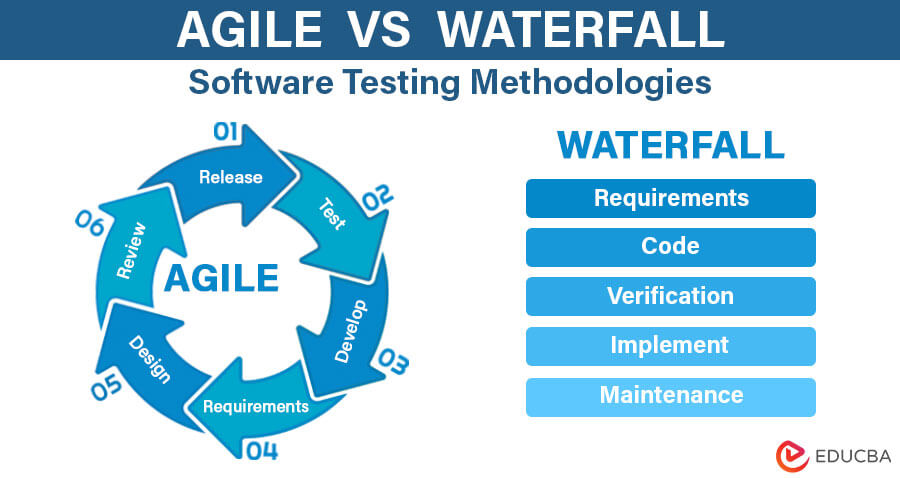Comparing Agile Vs. Waterfall Methodology – Introduction
Software testing methodologies play an important role in the software development life cycle, ensuring the delivery of high-quality software products. Two prominent methodologies are Waterfall and Agile, each with its principles, practices, and advantages. Let’s dive deeply into these key differences between agile vs waterfall methodology.

Agile Methodology: An Iterative Process
Agile is like a lively dance characterized by collaboration, flexibility, and an iterative cycle. Agile methodologies like Scrum and Kanban prioritize customer feedback, adaptability, and incremental development.
1. Iterative Development and Continuous Feedback
The Agile methodology works on sprints, which is a repetitive development cycle. This cycle usually lasts two to four weeks, where each sprint or cycle delivers a potentially new product version . Continuous feedback from stakeholders, including customers and end-users, is sought and incorporated into subsequent cycles. This ongoing feedback loop allows for dynamic changes based on evolving requirements.
2. Cross-Functional Roles and Collaborative Teams
In Agile, teamwork is key. Everyone involved, including developers, testers, and other team members, collaborates closely throughout the development process. This collaboration speeds up decision-making, resolves issues more quickly, and ensures everyone shares the same understanding of the project’s goals and objectives.
3. Integration Testing Early and Continuously
In Agile, integration testing begins early in the development process, unlike the Waterfall model. Testing is an important part of each iteration rather than a separate phase. This early and continuous testing approach ensures defects are identified and addressed immediately, leading to higher software quality.
The Waterfall Method: A Direct Approach
The Waterfall Method is like a well-organized orchestra, moving through stages one after another – requirements, planning, execution, testing, deployment, and maintenance. Each stage builds on the previous one, following a set plan and achieving specific goals.
1. Structured Planning and Documentation
The Waterfall method is known for its detailed planning and documentation at the start. Before writing any code, a comprehensive set of documents, including detailed requirements and design specifications, is created. While this approach provides clarity, it can take a long time, especially when dealing with changing requirements. This sequential approach may pose challenges in the domain of QA automation testing because it lacks the flexibility needed for agile and iterative development.
2. Consecutive Movement with Thorough Testing
Testing in the Waterfall model occurs after the development stage is complete. Testing teams come in towards the end of the project lifecycle to validate the system. Thorough testing, covering functional, integration, and system testing, ensures the final product aligns with the initially specified requirements.
3. Restricted Flexibility to Change
While the Waterfall approach provides an efficient and clear cycle, its inflexibility becomes apparent when dealing with changing requirements. Once a stage is completed, going back and making changes can be challenging and expensive. The Waterfall method is less suitable for projects where requirements are likely to change because it lacks adaptability.
Differentiating Testing Approaches: Agile methodology Vs. Waterfall methodology
Agile and Waterfall are two distinct software development methodologies, and they have different approaches to testing. Here are the key differences in testing approaches between agile vs waterfall methodology:
| Basis of Comparison | Agile | Waterfall |
| Development Approach | It is an iterative approach. | It is a sequence-based model; after the first step is completed, the second is started, and so on. |
| Testing Involvement | In Agile, testing begins as the project starts and continues throughout. | In Waterfall, testing comes after full development when testers check the entire system against requirements. |
| Model Completion and Delivery | The company delivers the model in stages allowing all the necessary changes based on client feedback in the subsequent set. | Incorporating client suggestions becomes challenging once the software has been delivered. |
| Planning | Planning is at every stage of development, before and after the software is developed. | Planning is done just once before the test cycle. |
| Client Involvement | The client’s suggestions are quickly incorporated. | Client suggestions are difficult to incorporate once the software is delivered. |
| Flexibility and Adaptability | Agile’s iterative development allows for regular adjustments to project needs. | In the Waterfall method, changes to requirements are challenging once a stage is completed. |
| Documentation | Minimal documentation; emphasis on working software. | Extensive documentation at each phase. |
| Quality Assurance | Integrated throughout the development process. | Separate phase after development. |
| Risk Management | It identifies and addresses risks throughout the project. | Risks are addressed at the beginning and end of the project. |
Head-to-Head Comparison Between With Infographics
Below is the top 10 difference between agile and waterfall:

Final Thoughts
Choosing between agile vs waterfall methodology depends on your needs. These testing methodologies are not a one-size-fits-all. Each approach has its assets and shortcomings, and the choice ought to be driven by the particular necessities and elements of the task.
Thus, the Waterfall development method was one of the first and traditional software development methods. The Agile framework and many more have taken over in today’s modern age. Designers keep customer requirements in mind when creating them, making them flexible and adaptable to changes at any stage in development. Both frameworks provide a benchmark base for software developers; they use fundamental principles outlined here to develop software.
Recommended Articles
This has been a guide to the difference between agile vs waterfall methodology. Here we also discussed the Agile vs Waterfall key differences with infographics and a comparison table. You may also have a look at the following articles to learn more –


